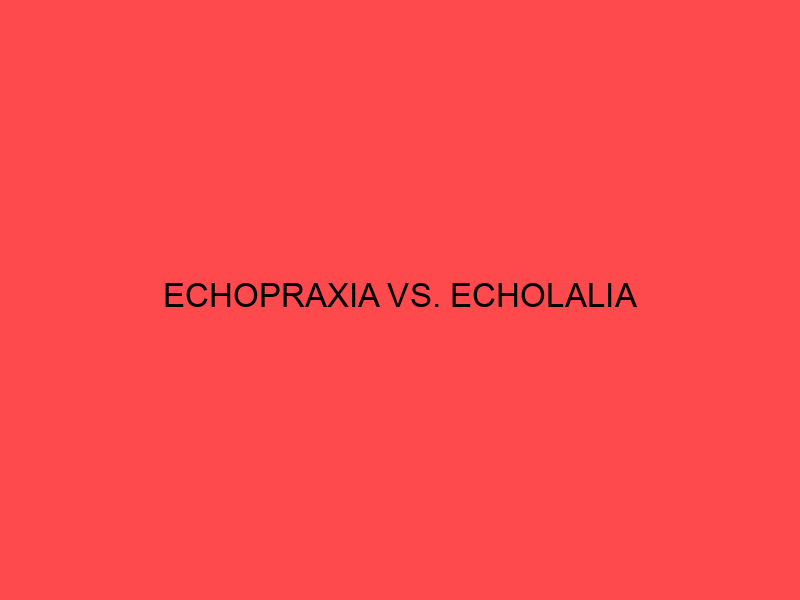Main Difference
The main difference between Echopraxia and Echolalia is that the Echopraxia is a catatonic behaviour, repetitive imitation of the movements of another person and Echolalia is a speech disorder that involves the automatic repetition of vocalizations made by another person.
-
Echopraxia
Echopraxia (also known as echokinesis) is the involuntary repetition or imitation of another person’s actions. Similar to echolalia, the involuntary repetition of sounds and language, it is one of the echophenomena (“automatic imitative actions without explicit awareness”). It has long been recognized as a core feature of Tourette syndrome, and is considered a complex tic, but it also occurs in autism spectrum disorders, schizophrenia and catatonia, aphasia, and disorders involving the startle reflex such as Latah. Echopraxia has also been observed in individuals with frontal lobe damage, epilepsy, dementia and autoimmune disorders; the causes of and the link between echopraxia and these disorders is undetermined.The etymology of the term is from Ancient Greek: “ἠχώ (ēkhō) from ἠχή (ēkhē “sound”) and “πρᾶξις (praksis, “action, activity, practice)”.
-
Echolalia
Echolalia is defined as the unsolicited repetition of vocalizations made by another person (by the same person is called palilalia). In its profound form it is automatic and effortless. It is one of the echophenomena, closely related to echopraxia, the automatic repetition of movements made by another person; both are “subsets of imitative behavior” whereby sounds or actions are imitated “without explicit awareness”. Echolalia may be an immediate reaction to a stimulus or may be delayed.The word “echolalia” is derived from the Greek ἠχώ, meaning “echo” or “to repeat”, and λαλιά (laliá) meaning “speech” or “talk” (of onomatopoeic origin, from the verb λαλέω (laléo), meaning “to talk”).
-
Echopraxia (noun)
The involuntary repetition or imitation of the observed movements of another.
-
Echolalia (noun)
The immediate, involuntary, and repetitive echoing of words or phrases spoken by another.
-
Echolalia (noun)
An infant’s repetitive imitation of vocal sounds spoken by another person, occurring naturally during childhood development.
-
Echolalia (noun)
Any apparently meaningless, repetitious noises, especially voices.
-
Echopraxia (noun)
meaningless repetition or imitation of the movements of others as a symptom of psychiatric disorder.
-
Echolalia (noun)
meaningless repetition of another person’s spoken words as a symptom of psychiatric disorder.
-
Echolalia (noun)
repetition of speech by a child learning to talk.

